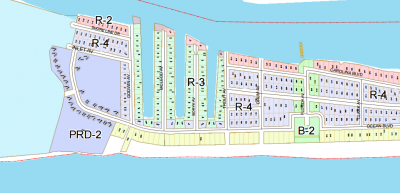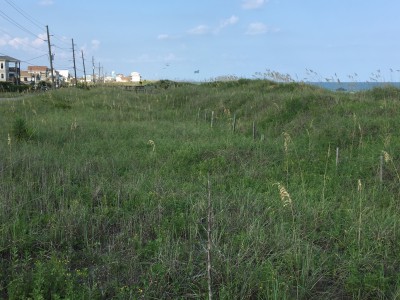TOPSAIL BEACH – A judge has signed off on a temporary restraining order prohibiting Topsail Beach from issuing building permits for a stretch of oceanfront properties at the southern end of town.

The Pender County Superior Court judge on Dec. 28 granted a motion filed on behalf of a group of nearly 40 Topsail Beach property owners to extend a temporary restraining order against the town. The extension is open ended.
Supporter Spotlight
The property owners filed a lawsuit against the town five days after a majority of Topsail Beach commissioners on Dec. 14 voted to repeal the town’s longstanding dune protection ordinance, one that has been a source of contention for more than a year and caught the attention of several North Carolina senators who represent some of the state’s coastal districts.
The ordinance, adopted in 1994, limited the amount of sand that could be moved on oceanfront lots during building, a measure designed to protect the secondary dune system and reinforce storm protection for second- and third-row homes landward of the beach.
Alleviating that protection opens the door for development of more than 20 oceanfront lots between the Sea Vista Motel and Serenity Point, according to the lawsuit.
Building on those lots will irreparably damage the dunes that the town and Mother Nature have restored during the past couple of decades, the suit alleges. Damaging the protective dunes, the plaintiff’s argue, will threaten their homes as well as the discount they and the rest the town currently receive through the Federal Emergency Management Agency’s National Flood Insurance Program.

“They want to preserve the protective dunes located at south Topsail Beach,” said Todd Roessler, a Raleigh-based attorney representing the property owners. “Really what we’re concerned with is the increase in flood risk if those dunes are destroyed.”
Supporter Spotlight
Town Manager Mike Rose said there are still town codes designed to protect properties against the threat of flooding.
“The town still has things like the flood damage protection ordinance in place, which would have to be adhered to throughout the town in terms of development,” he said. “You still have to meet those regulations.”
Property owners listed in the lawsuit own homes directly behind the vacant oceanfront lots.
For months, those property owners implored commissioners to reject revising the dune ordinance to allow more sand to be moved on oceanfront lots. Commissioners were considering the changes after the property owners of those beachfront lots argued that revisions the board adopted in June 2015 rendered their property unbuildable.
Sen. Michael Lee, R-New Hanover, owns one of the homes along a series of three manmade canals adjoining New Topsail Inlet.

He, along with senators Bill Rabon, R-Brunswick, Harry Brown, R-Onslow, Norman Sanderson, R-Pamlico, and Bill Cook, R-Beaufort, signed a letter urging commissioners to either reject the proposed ordinance revisions or table their vote until after the legislature returns to session in the coming weeks.
The letter was emailed to the town on the afternoon of Dec. 13, one day before the board was expected to vote.
The timing of the letter irked board members, many of who expressed frustration about what they said was a sudden, inexplicable involvement of the state on an issue the town had been working on for a year and a half.
The board’s 4-1 vote was preceded by accusations. Commissioner Julian Bone, the only one who voted against repealing the ordinance, was asked if requested that the senators write the letter. Though she did not name Lee, Commissioner Linda Stipe said during the meeting that one of the senators who signed the letter had a conflict of interest.
During an interview last month in his law office in Wilmington, Lee rejected the accusation, said he was contacted by someone, though not Bone, a few days prior to the Dec. 14 meeting, that he made board members aware of his concerns, and that he attempted on several occasions to reach out to town representatives to offer help.
“There’s no conflict of interest,” he said.
The four-bedroom, 1,280 square-foot house at 120 Boryk Ave. he bought in 2013 is closer to the sound than the ocean. There’s not an ocean view from the home. It’s also for sale, placed on the market more than a month ago.
Financial pressures of running his law firm while serving in the legislature – he was appointed to the 9th District in August 2014 and elected the following November – prompted his decision to put the house up for sale, he said.
Though Topsail Beach is not in his district, Lee said it made sense for him to ask other coastal senators to join him in offering to help the town come up with an alternative to the proposed revisions. The remaining senators who signed the letter did not respond to requests for comment.

As a homeowner in the town, Lee said he knew the perception that was created when a house was built on one of the oceanfront lots before commissioners amended the dune ordinance in 2015.
“The reason that the coastal senators are concerned is because we are trying to establish a statewide source of funding for beach re-nourishment as it dwindles from the federal government,” he said. “The issue that other senators have raised when we have discussed these issues is the fact that beach re-nourishment only benefits a very few people in the state and why should the state have to fund it. Even if everything is done in accordance with what is allowed we wanted to make sure that perception was not going to be there that we re-nourish the beaches so people can haul off the back side of the dune to build.”
Topsail Beach has just the beach nourishment success story the senators could share with other legislators, Lee said.
The American Shoreline Beach Protection Association named Topsail Beach one of the top five “best restored” beaches in the country in 2016.
In 2010, the town initiated a project that aligns dredging New Topsail Inlet with beach nourishment. Shoaled sand is pumped from the inlet and placed onto the beach. This cuts routine beach nourishment costs.
The town has received more than $3.9 million since 2012 from the state shallow draft inlet dredging fund to unclog the inlet.
Lee said he wanted to show non-coastal legislators how Topsail Beach has been successful and responsible in using state funds to nourish its beach.
“It was just the perfect example because it was a town that was being innovative in the way they did it, that was successful in the way they did it, that were efficient and had great results, and had this protection of the resource in place so it was the poster child for us to bring forward someone that was doing it right,” he said.
Lee said he “reached out on multiple occasions” to various town representatives and “directly expressed” his concerns to some of the board members when they visited his Raleigh office earlier last year.
“I explained this to the commissioners,” he said. “I explained this to their lobbyist. I explained this to everybody that called me on both sides of this issue. I’ve talked to people about this for a year.”

Topsail Beach Mayor Howard Braxton recalls the meeting in Raleigh last spring differently.
“We just went by (Lee’s office),” Braxton said. “He simply said he didn’t like what was going on. We did not sit down and talk with him. We’d like to and we’ve been trying to.”
The board is now seeking a meeting with all five senators by month’s end.
“We have to bring this thing to some closure,” Braxton said.
As for the repealed ordinance, Braxton said the board is still going to be working on it.
“We don’t want anything to happen on those lots that create flood and if that happens we will not allow people to build,” he said. “We’re hoping we can still work and make some changes that would involve all the beach communities.”
Lee said he is not sure what the legislature can do now that the ordinance has been repealed.
“The reason to put a hold on everything was so that we could get into session,” he said. “While we still want to help I think that our options might be dramatically limited because they couldn’t wait another four weeks or six weeks. Aside from the unfair comments and statements that were made, I’m frustrated because this was a perfect opportunity to do something for coastal North Carolina. You had the majority leader of the North Carolina senate, you had the rules chairman of the North Carolina senate and three other coastal senators reaching out to help and now it may be incredibly difficult for us moving forward on what we had planned to do.”







